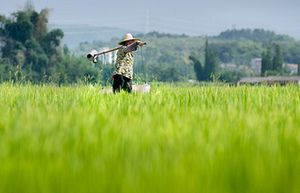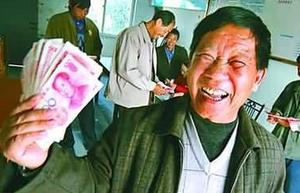China is moving to replace decades-old agricultural subsidies with a more flexible pricing mechanism, as domestic harvests in the world's largest grain importer are expected to see their 11th consecutive year of growth.
Experts say the change will not endanger food security nor result in steep price drops in major agricultural products.
Decisions to scrap the minimum purchasing price for rice, the temporary storage policy for soy and cotton and other agricultural subsidy policies were made on Wednesday at a State Council executive meeting led by Premier Li Keqiang.
Under the new policy, the government will set up a target price for each kind of major agricultural product. Farmers will receive subsidies from the government when the market price is below the target, while low-income groups will receive subsidies when the market price sours.
The reform, which aims to restore a market-oriented pricing mechanism, as domestic grain prices are usually above the global price, will be conducted first from selected areas and particular types of agricultural products.
According to a statement released after the meeting, soy and cotton will be first in line to test the concept before the policy is applied to other major agricultural products, such as wheat, rice and corn.
China gradually has set up various subsidy policies since 2004 to shore up grain prices and protect the motivation for farming.
These subsidies, along with the removal of the agriculture tax, have somehow contributed to the country's decadelong growth of grain output. But analysts argued that the minimum purchasing price, which is much higher than the market, has resulted in a considerable price discrepancy between the domestic and global markets.
This year, the government increased its mandated minimum purchasing price for wheat by 70 percent to ensure food security.
As Wednesday's meeting pledged more market involvement in the pricing of agricultural products, the central government's responsibility for price controls will be mainly seen with "grains, cotton, oil plants and sugar plants", the statement said.
"Under the premise of self-sufficiency and food security, policies on imports and exports and the storage of grains will be adjusted to prevent steep price fluctuations," it said.
"The harvest of the summer grain crop this year is settled,... but the shortage of storage rooms has become a problem," the statement said, pledging that the country will build another 100 billion metric tons of storage capacity by 2015.
|
 |
 |
| Farm price targets 'will stabilize domestic market' | Xiamen lowers farm product price through subsidy plan |
